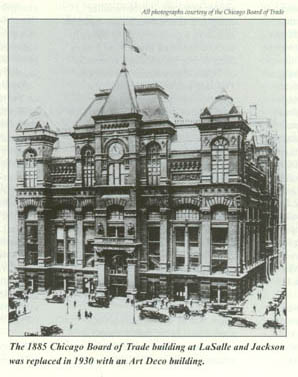|
Playing to win
The Chicago exchanges helped transform that city into a Midwestern capital of finance. Now they could offer all Illinoisans some early lessons on competing in a global economy
Analysis by Burney Simpson
The Teletype clatters out an order in Chicago. A clerk rips the paper from the box, snaps off the bottom copy and hands the rest to a runner - a job title of concise accuracy. He darts from the booth to the trading floor, where a thousand men stand on raised steps, yelling at one another and scribbling furiously. The din is enormous. But our runner scrambles through the "pit," finds his firm's trader and hands him the order. That man grabs it, glances at the wall-length chalk board where clerks are writing numbers, erasing, writing more numbers. The trader cries out and 10 men respond. "Sold!" He then scrawls the results on the order and gives it to the runner, who speeds back to the booth. The clerk types up the information, presses "send" and the order is on its way back to Decatur.
 That used to be a typical transaction at Chicago's Board of Trade. It probably took a minute. And getting the job done didn't require much more than a rudimentary education, a pair of strong legs and the fortitude to withstand the stress of repetitive tasks.
In this high-tech age, it's difficult to believe this simple, labor-intensive exchange revolutionized the market economy of the expanding West and propelled Chicago into the forefront of American cities.
Yet it did. The opening of the board's trading floor in 1848 was indeed a defining moment in Chicago's transformation from a muddy rest stop for fur traders to a Mid-western capital of finance. The idea was straightforward: Create a central place where farmers and grain companies could lock in prices for their products and labor, and where investors could profit from market savvy. But the creation of an exchange for buyers and sellers of farm produce, along with the rise of the railroads for transporting it, gave Chicago the commercial momentum to edge past river-city St. Louis in the race to be the gateway to the West.
Sure, Chicago had the good fortune to grow up at the center of all that restlessness, in proximity to a rich prairie and a great inland sea. From the earliest days, the city could draw brawn and talent from surrounding regions and other lands. But that was never the whole story. Chicago's greatness has been due, in large part, to entrepreneurial grit, to a willingness to try new technologies and new ways of doing business, and to take risks that would enable the city to transcend the limits of geography.
The business that began on a street corner has moved to successively
|
